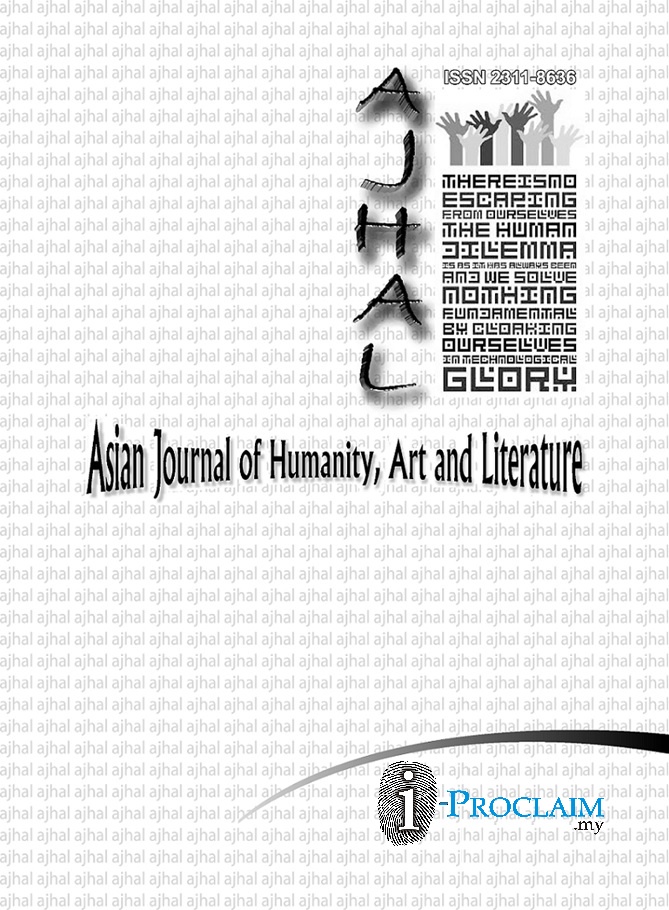The Echoes of Partition: Representations of the 1947 Bangla Division in Bengali Short Stories
DOI:
https://doi.org/10.18034/ajhal.v11i1.785Keywords:
Partition of Bengal, Bangla short stories, violence, displacement, identity, cultural memory, literary techniquesAbstract
The devastating 1947 Partition of Bengal caused significant harm to the social, cultural, and psychological fabric of Bengali society. This study examines how the Partition is portrayed in a few preselected Bangla short stories, focusing on themes of violence, displacement, identity, and loss. The research intends to examine how these stories portray the psychological and emotional suffering of the Partition through realism, symbolism, and stream of consciousness through a qualitative examination of linguistic strategies, including Rabindranath Tagore's The Home and the World, Tahmima Anam's The Bones of Grace, and Sunil Ganguly's The Refugee. The results imply that these stories contribute to a broader cultural understanding of the lingering consequences of the Partition in addition to capturing the psychological suffering of the individual and the community. This study concludes a significant difference by considering the value of Bangla short stories as a tool for understanding and attempting to preserve the memories of the Partition.
Downloads
References
Ancuta, K. (2021). South Asian Gothic: Haunted cultures, histories, and media. University of Wales Press.
Assmann, J. (2011). Cultural Memory and Early Civilization: Writing, Remembrance, and Political Imagination. Cambridge University Press.
Bose, S., & Jalal, A. (2022). Modern South Asia: History, culture, and political economy. Routledge.
Braun, V., & Clarke, V. (2006). Using thematic analysis in psychology. Qualitative research in psychology, 3(2), 77–101.
Bryman, A. (2016). Social research methods. Oxford University Press.
Caruth, C. (2016). Unclaimed experience: Trauma, narrative, and history. JHU press.
Caruth, C. (2020). Unclaimed experience: Trauma, narrative, and history. Johns Hopkins University Press.
Chavoshi, B. N., Ilbeigi, M., Karimi, M., Asgharzadeh, A., & Behrouzifard, E. (2024). Investigating the relation between emotional and cultural mapping by considering collective memory in urban design from perspective of citizens (case study: Tehran, Iran). City, Territory and Architecture, 11(1), 14.
Das, T. K., Bhattacharyya, R., & Sarma, P. K. (2022). Revisiting geographies of nationalism and national identity in Bangladesh. GeoJournal, 87(2), 1099–1120.
Dubey, I. (2021). Remembering, forgetting and memorialising: 1947, 1971 and the state of memory studies in South Asia. India Review, 20(5), 510–539.
Erll, A. (2011). Literature as a medium of cultural memory. In Memory in Culture (pp. 144–171). London: Palgrave Macmillan UK.
Ganguly, S., & O'Donnell, F. (Eds.). (2022). Routledge Handbook of the International Relations of South Asia. London and New York: Routledge.
Gautam, D. P. Abduction, Recovery and Rejection: Plight of Women during Partition. Halbwachs, M. (1992). On collective memory University of Chicago Press. Chicago IL.
Haq, K. (2022). The Partition and Bengal, seventy-five years on. The Journal of Commonwealth Literature, 57(3), 501–516.
Herman, J. L. (2015). Trauma and recovery: The aftermath of violence--from domestic abuse to political terror. Hachette UK.
Hornabrook, J., Clini, C., & Keightley, E. (2024). Moving Memories: Remembering, and Forgetting, the Partition of Bengal Between South Asia and the UK. In The Long History of Partition in Bengal (pp. 184–208). Routledge India.
Hornabrook, J., Clini, C., Nataraj, P., & Keightley, E. (2024). Introduction–Partition and the South Asian diaspora: exploring (inherited) memories and creative practices of remembering. South Asian Diaspora, 16(2), 157–165.
Iqbal, A. (2022). Two Partitions: Postcolonial Culture and Nation in Bangladeshi and South Asian Anglophone Literatures. Michigan State University.
Krippendorff, K. (2018). Content analysis: An introduction to its methodology. Sage publications.
LaCapra, D. (2002). Writing History Writing Trauma. Holocaust and Genocide Studies, 31(2), 301–306.
LaCapra, D. (2014). Writing history, writing trauma. JHU Press.
Majumdar, S. (2023). Boundaries and Belongings: Muslim Migration, Homelands, and Subjectivities in Bengal, 1945-1970 (Doctoral dissertation, University of Illinois at Chicago).
Mannan, M., Mustafa, Z. B., Aziz, S. F. B. A., & Maruf, T. I. (2023). Technology adoption for higher education in Bangladesh–development and validation. Journal of Education and Social Sciences, 24(1), 1-9.
Mannan, M., & Maruf, T. I. (2024). Perceived Usefulness and Perceived Ease of Use in Bangladesh's Worth of Online Education System. In Second International Conference on Innovations in Management, Science, Technology and Automation in Sports (ICIMSTAS-2023).
Pattanaik, S. S. (2024). The Enduring Partition and the Insider-Outsider Debate. Strategic Analysis, 48(2), 153-161.
Reddy, P. C. (2023). Revisiting India’s Past: Commemoration Volume to Prof. Vijay Kumar Thakur. Blue Rose Publishers.
Srivastava, P. (2022). Book review: Narrating South Asian Partition: Oral history, literature, cinema. Memory Studies, 15(2), 504-507.
Van Bijlert, V., & Bangha, I. (2019). Rabindranath Tagore (1-22)
Wertsch, J. V., & Jäggi, O. L. (2022). Habits of collective memory. Progress in Brain Research, 274(1), 149-166.
Wilton, D. (2021). ‘We are the Dispossessed’: Displacement, Knowledge Production and Bare Life in West Bengali Climate Fiction. Parallax, 27(3), 344-361.
Downloads
Published
Issue
Section
License
Copyright (c) 2024 Farjana Soriya; Tarekol Islam Maruf; Motia Mannan

This work is licensed under a Creative Commons Attribution-NonCommercial 4.0 International License.















